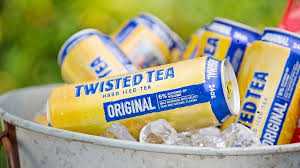
Twisted Tea is more than just an alcoholic beverage—it’s a cultural phenomenon. Known for its refreshing taste and easy drinkability, Twisted Tea is a brand of hard iced tea that has taken the beverage world by storm since its inception in 2001. Produced by the Boston Beer Company, the same parent company responsible for Samuel Adams beers, Twisted Tea has captured the attention of both casual drinkers and tea enthusiasts alike. The brand’s combination of tea flavor with alcohol has carved a niche in the ever-evolving ready-to-drink (RTD) beverage market. But Twisted Tea is much more than just a drink; it represents a growing shift in consumer preferences and a unique brand personality that resonates with millions.
The Origins of Twisted Tea
The Boston Beer Company, founded by Jim Koch in 1984, was initially known for its craft beer line, with Samuel Adams becoming one of the most recognized names in the American beer market. In the early 2000s, the company saw an opportunity to diversify its portfolio. The rise of alternative alcoholic beverages like flavored malt drinks and the increasing popularity of ready-to-drink cocktails signaled a shift in consumer preferences. People were looking for more than just beer or wine; they wanted something unique, refreshing, and convenient.
Enter Twisted Tea, a product designed to capitalize on the appeal of iced tea but with an alcoholic twist. Unlike traditional beer, which tends to be heavy and bitter, Twisted Tea offers a light, sweet, and tangy experience. The idea was simple: combine the refreshing qualities of iced tea with the buzz of alcohol, creating a drink that was both familiar and exciting. Twisted Tea quickly gained traction, especially among younger adults looking for something new.
The Unique Flavor Profile
What sets Twisted Tea apart from other alcoholic beverages is its distinctive flavor. While beer often carries a hoppy bitterness and wine can be dry or tannic, Twisted Tea is crafted to resemble a traditional sweet iced tea. The tea itself is brewed from select tea leaves and blended with real lemon to create a balanced, refreshing taste. This blend results in a beverage that is both sweet and tangy but without being overwhelmingly sugary.
The alcohol content in Twisted Tea typically hovers around 5% alcohol by volume (ABV), which is on par with most standard beers. However, its lack of a pronounced alcohol taste makes it easy to consume, especially for those who may not enjoy the taste of traditional beers or cocktails. This smooth, drinkable quality has contributed to its widespread appeal, particularly in casual settings like picnics, tailgating, or social gatherings.
In addition to its original flavor, Twisted Tea has expanded its product line to include various flavors, such as Half Half (a mix of iced tea and lemonade), Raspberry, Peach, and Mango. These variations allow consumers to enjoy the same alcoholic twist but with a new taste experience.
The Twisted Tea Experience: Marketing and Brand Identity
Twisted Tea’s success is not just about its flavor; it’s also about the brand’s identity. The beverage has built a reputation for being fun, laid-back, and approachable, appealing to a wide audience from casual drinkers to tailgating sports fans. The brand’s marketing campaigns have leaned heavily into the idea of living “twisted”—enjoying life, having fun, and not taking things too seriously.
One of the most recognizable aspects of Twisted Tea's branding is its focus on real people and real moments. Their advertisements and social media campaigns often feature everyday individuals enjoying Twisted Tea in various laid-back settings, such as backyard barbecues, beach outings, and tailgate parties. This “real-life” approach resonates with consumers who see Twisted Tea as a drink for all occasions, perfect for unwinding with friends and family.
Twisted Tea's advertising has also cleverly tapped into viral culture, even becoming an internet sensation with the “Twisted Tea Incident.” In December 2020, a viral video showed a man using a can of Twisted Tea as an improvised weapon during a heated confrontation in a convenience store. The video became a meme, further cementing Twisted Tea's place in internet lore and boosting its recognition. While the event was unplanned, the brand smartly embraced the viral attention, with social media posts and fans turning the moment into a marketing opportunity.
The Growing Popularity of Ready-to-Drink (RTD) Beverages
Twisted Tea’s rise to prominence reflects a larger trend in the beverage industry: the increasing demand for ready-to-drink (RTD) alcoholic beverages. The RTD market, which includes hard seltzers, pre-mixed cocktails, and hard teas, has seen explosive growth in recent years. According to a report by IWSR, a global leader in alcohol market analysis, the RTD category grew by 43% in the U.S. in 2020, driven by consumers’ desire for convenience, variety, and lower-alcohol options.
Part of Twisted Tea’s success can be attributed to this shift in consumer behavior. As lifestyles become more fast-paced and consumers look for quick, on-the-go options, beverages like Twisted Tea offer an easy solution. There’s no need for mixing drinks or carrying multiple ingredients; a can of Twisted Tea is ready to go right out of the cooler.
The brand also benefits from the increasing popularity of “better-for-you” alcoholic options. While Twisted Tea isn’t marketed as a health drink, its use of real brewed tea and relatively simple ingredient list appeals to consumers looking for drinks that seem less processed or artificial. Compared to sugary cocktails or calorie-heavy beers, Twisted Tea strikes a balance between indulgence and refreshment.
The Future of Twisted Tea
As Twisted Tea continues to grow in popularity, it’s poised to maintain its position as a leader in the hard tea market. The brand has shown a willingness to innovate and expand its product offerings, which bodes well for its long-term success. For example, in response to consumer demand, Twisted Tea has introduced “Light” versions of its products, which offer the same flavor with fewer calories and less alcohol. These options cater to those looking for a lighter drinking experience while still enjoying the signature taste.
Moreover, Twisted Tea’s success has inspired other companies to enter the hard tea space, leading to increased competition. Brands like Truly and White Claw, known primarily for their hard seltzers, have started offering hard teas to capitalize on the growing trend. However, Twisted Tea’s status as one of the original and most recognizable names in the category gives it a competitive edge.
Conclusion
Twisted Tea has come a long way since its inception in 2001. What started as a unique experiment in blending tea and alcohol has turned into a beloved brand with a dedicated fanbase. Its ability to tap into consumer preferences for light, flavorful, and convenient beverages has allowed Twisted Tea to stand out in a crowded marketplace. With its expanding flavor lineup, strong brand identity, and continued innovation, Twisted Tea is more than just a drink—it’s a lifestyle.
The future looks bright for Twisted Tea, as it continues to navigate an evolving beverage landscape. Whether you’re enjoying a cold can at a summer barbecue or unwinding after a long day, Twisted Tea offers a refreshing alternative to traditional alcoholic beverages, and its success is a testament to the power of innovation in the world of drinks. As the ready-to-drink beverage market continues to grow, Twisted Tea is sure to remain a favorite among consumers for years to come.








